1 Dec 2015
Rob reports from COP21 in Paris: Day Three
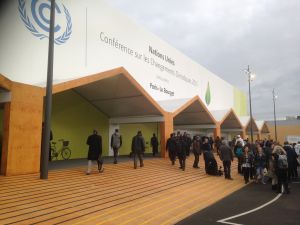
Today was my first visit to La Bourget, the vast conference centre complex on the edge of Paris where COP21 is taking place. Amid very tight security, helicopters flying overhead, Robocop-style policemen and police on horseback, it certainly felt very different to the events and venues I had been at so far. About 10,000 people were at La Bourget, and today was the opening, and the day when the various world leaders arrived and the whole thing got underway. By the time I made it through all the security, I had missed the opening speeches, but given that they were in French and all the translation headsets were in use, I don’t think I would have got much out of them anyway.
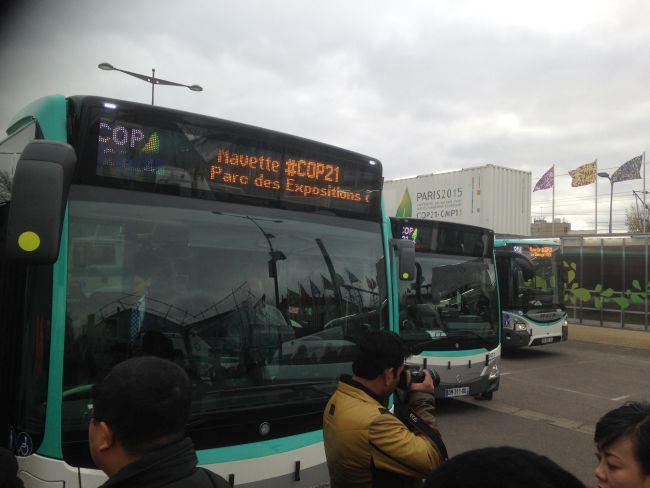
First I saw was Christiana Figueres, Executive Secretary of the UN Framework Convention on Climate Change, who stated that the conference needed to produce “the necessary support for the developing world”. The past year, she said, has been “a turning point” and we are now seeing an “irreversibility in direction”. COP21, she said, needs to produce “agreed milestones and a predictable timetable, that responds to the urgency of the science”. “The world is looking to you”, she said, “the world is counting on you”.
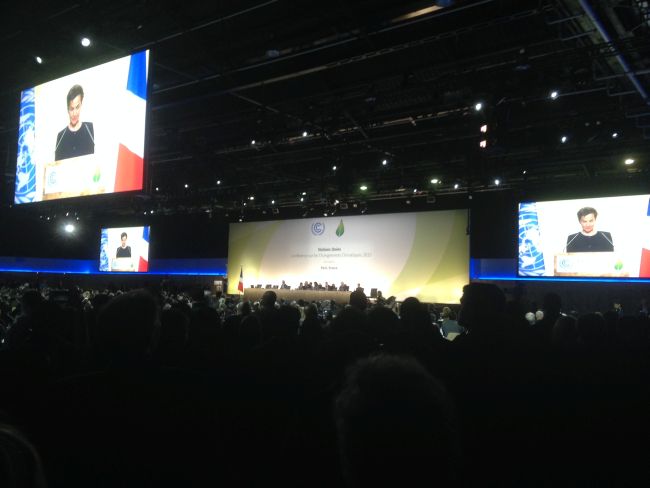
The Prince of Wales spoke next (an odd choice I thought, given that the event is taking place in France), appealing to the delegates to “think of your grandchildren and of those with no voice”. “No one should assume”, he continued, “that for our today, they should give up their tomorrow”. “In damaging our climate” he said, “we become the architects of our own destruction”. As someone responded on Twitter when I mentioned this quote, it was good to see him not passing up the opportunity to mention architects!
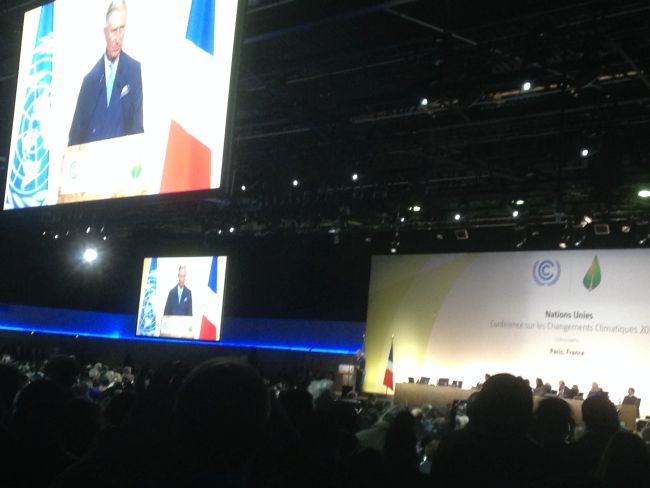
After a couple more speeches in French which went completely over my head due to lack of headset, I was back out into the conference centre. COP21 is vast. Getting a handle on what is happening, where events are and which things you can or cannot get into takes some getting used to. At one point, as the huge crowd made its way out of the opening plenary, I ended up about 4 feet away from Al Gore, wanting to give him a copy of ’21 Stories of Transition’ but couldn’t before the current of the crowd took him away elsewhere.
Each country has its own zone, a space in which to trumpet the good work it is doing for climate change. India wins our ‘Oxymoron of the Day’ award, with its very impressive water projector thing (see video below), trumpeting how it was building the ‘World’s Greenest Airport’:
During this time, over 100 world leaders had 3 minutes each to set out their position coming into the talks. I missed most of them as I was wandering around getting my bearings, but they were interesting. President Obama stated that “One of the enemies we will be fighting at this conference is cynicism – the presumption that we can’t do anything about climate change”. It was a speech that bolstered the idea that he was coming to show leadership and to get the right deal at COP21, one that 350.org cautiously praised, writing “President Obama has lifted up climate change as the great moral issue of our time. Now, he must deliver”.
David Cameron, whose government have done huge damage to the climate reputation of the UK, in a speech replete with all the usual stuff about grandchildren, set his ambitions suitably low by saying that “we need a deal that keep two degrees alive“, not that keeps the world below two degrees. Quite different things. I imagine that quite a few people watched their own leaders and felt, as I did with Cameron, the yawning gap between words and deeds.
Yet something feels very different here. None of that “the American way of life is non negotiable” crap that George Bush turned up at climate summits with. That does now feel very much up for being negotiated. And although I may be being terribly naive, I get a sense here that there is a real determination for this summit not to be the debacle previous ones were.
I spent some time just observing the place. Conferences like this are fascinating things to observe. The wide arrays of national dress among the suits, Peruvian natives with face paint and feathers, women in traditional Singapore dress, Zen monks. And every now and then a fast-moving group of men in dark suits with some President or other in the centre of the huddle. And lots of news crews. Lots. News crews interviewing anyone and everyone in the search for anything they could broadcast about COP21. At one point I went to the toilet, and in the toilets was a news crew, interviewing the rather bewildered-looking toilet attendant woman for her views on COP21! Luckily they didn’t also follow me into the cubicle for a quote.
I went to a session called Fossil Fuel Subsidy Reform: The Missing Piece of the Climate Change Puzzle, promoted by the The Friends of Fossil Fuel Subsidy Reform & The Prince of Wales’s Corporate Leaders Group. It was fascinating. The meeting unveiled the group’s Communique which you can read here. Their basic argument is that fossil fuel subsidy is a form of “negative climate finance”, and that one third of carbon emissions between 1980 and 2010 were directly as a result of subsidies. The argument is usually made that fossil fuel subsidies keep the price of fossil fuels low for consumers, but actually they mostly benefit those who use a lot of fossil fuels (i.e. not the poor), so removing the subsidy and instead using the money to support healthcare, education and renewable energy would be far more skilful.
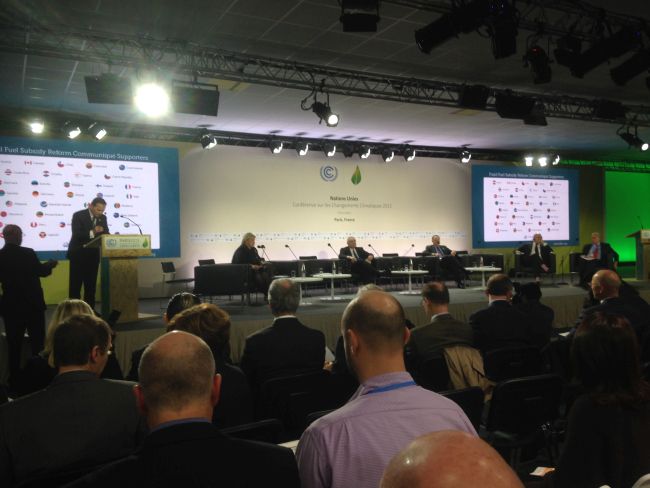
The Communique was presented by the Prime Minister of New Zealand who called for a broad coalition on ending subsidies for fossil fuels, and the list of signatories is already quite impressive. Odd though to see the UK on there, with the UK now being the only country in the G7 to actually increase fossil fuel subsidies. Yet with the leaders of Norway, Sweden, France, the Netherlands, New Zealand and others, as well as leaders froom business, all stressing the importance of this, recognising the the current low oil prices are a great opportunity for reform, it did feel like something very substantial. In the questions at the end, the New Zealand Prime Minister was asked what the deadline was for this, to which he replied “as soon as is practicable”.
On this, the first day of the negotiations, the pledges so far obtained from all the nations would lead to a 2.7 degree increase in world temperature. The next two weeks will show how low the negotiations are able to drive that figure. But much is now different from previous such conferences. Australia and Canada have new governments who are no longer climate sceptics. Canada’s new President, Justin Trudeau, arrived in Paris saying “we’re here to help”. The US and China are now ready to take this seriously, and talk of “phasing out fossil fuels” is now part of the political discource. This short video from the Guardian captures where the optimism comes from and where the unknowns still lie:
As Geoffrey Lean put it, writing in the Telegraph:
“The fact is that, whatever is decided (or not) in the French capital over the next two weeks, the world is now irrevocably embarked on the greatest transition since the Industrial Revolution – towards a low (and eventually no) carbon economy”.
Later that afternoon I went to a less interesting session called the ‘UN Secretary-General’s High-Level Meeting on Resilience‘, which was rather disappointing and which was basically various world leaders, including Egypt’s brutal dictator of a President, Abdel Fattah el-Sisi, talking about the need to adapt to climate change and to build resilience, and also the President of Barbados, who said that “the Carribean cannot build resilience to a three degree world”. Other than that, it was pretty tedious stuff.
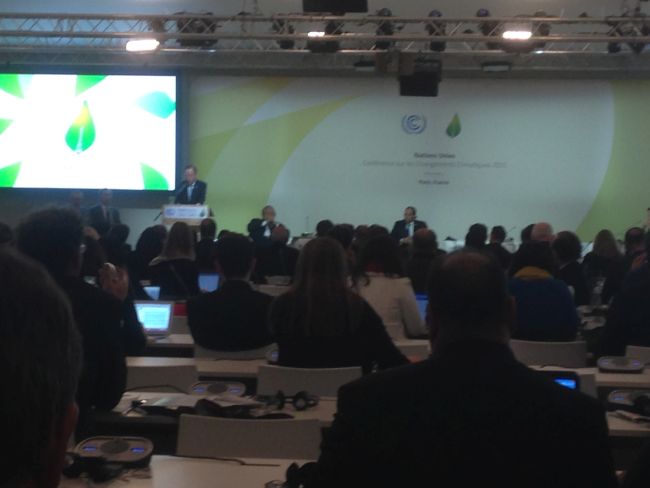
I left feeling curiously positive about it all. No the deal that will be reached in 2 weeks time won’t be enough. But as I wrote a couple of weeks ago, it’s a moment in a flow of change and represents already a huge shift on where we were before. There is much to do, and much negotiating to be done, but I was left with a strong sense of commitment from the event. We’ll see. Given the process of COP, it could still be derailed by relatively few people, but the opening omens are good.
Then it was back onto the shuttle buses and the RER train to head back into Paris. At Place to B, I was to take part in an event called ‘Place to Brief’, a kind of live online webinar discussion-with-an-audience type thing. It featured myself, John D Liu and Barbara Glowczewski, with music by Charlie Winston. I did record it so as to share it with you, but left my recorder at the venue, and the film isn’t yet online, so I will post that in this space when I have it. Very good fun it was, great crowd, good questions, very enjoyable Indian meal afterwards.
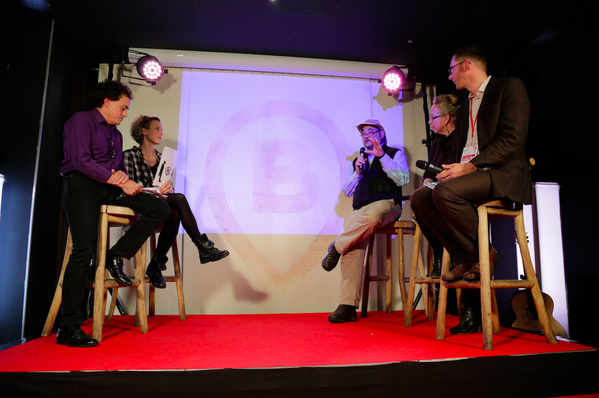
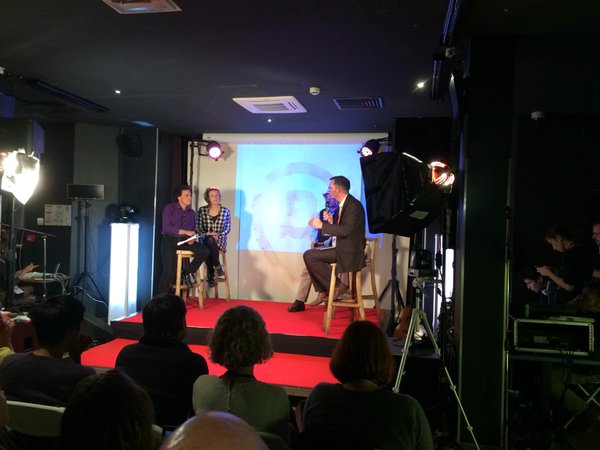
Tomorrow I am going to the premiere of the film Demain (Tomorrow): the movie. There are posters all over the city, and I make an appearance in it wafting a Totnes Pound, and I’ve been stopped a few times by people saying “you’re the guy from ‘Demain‘! So, in advance of me telling you all about that tomorrow, here’s the trailer. Goodnight!